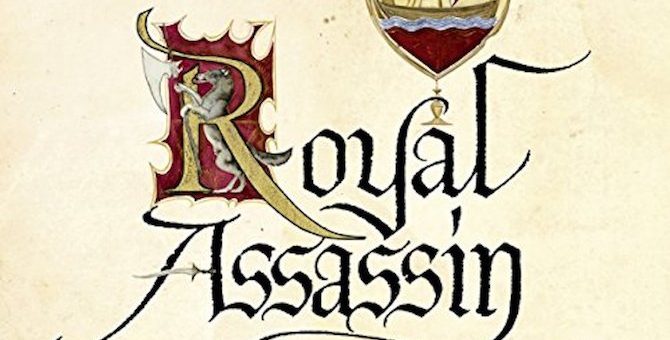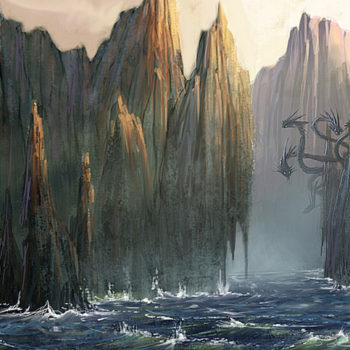
Rereading the Farseer Trilogy: Book II, Royal Assassin
- Posted by Augur Blog
- On October 9, 2019
- 0 Comments
- fantasy, Farseer trilogy, Robin Hobb
By Mado Christie
Before we get into the substance of this book I need to just point out the cover of this edition of Royal Assassin, because it is such a classic, over-the-top fantasy cover. That’s not to say it’s bad, it was just such a hilariously jarring moment to come across it again and realize that, had I not known what it contained, I would have dismissed it almost immediately as something I wouldn’t be interested in. I guess that’s why the old cautionary expression exists!
On to the book itself. Once again, I thoroughly enjoyed re-reading this book. Had I known how much I would enjoy this process, I would have started re-reading this trilogy much earlier. Although it’s the second in a trilogy, Royal Assassin in no way suffers from what some have called “middle book syndrome” or “second book slump”. In fact, I remember being surprised, the first time I read this trilogy, that I found the second book almost more enjoyable than the first.
There are elements of this book that perhaps should be drawbacks but which, I think, are either justified or aren’t a problem at all. One of these elements is repetition. There are certain scenes or series of actions that occur multiple times with only subtle variation throughout the book. However, I still found the story totally compelling. One reason for this is that, as in the first book, Royal Assassin is so entirely focused on Fitz’s inner monologue that it almost doesn’t matter what action is taking place. We are fully immersed in his thoughts and emotions, and those are dramatic enough on their own. The other reason is that one of the central components of this book is how caught the Buckkeep community is in an uneasy, never-ending loop. Between trying to fend off unpredictable raiders and trying to keep the court from imploding from within, Fitz et al have to constantly do small scale damage control and relive the same perils and frustrations again and again. I appreciate Hobb’s ability to make this repetition actually feel tense and to remind readers of the stakes without beating us over the head with them.
There was one thing that took me out of the story sometimes, however, and that was the dissonance between Fitz’s age (mid-teens) and his relative maturity in this book. For the most part his inner monologue sounds almost too old, too sure of itself. I found myself wishing for a bit more awkwardness from Fitz, in order to empathize with him more. Fitz makes mistakes, of course. He jumps to conclusions, makes rash decisions, and overall acts like the flawed character I know and love, but sometimes I could barely believe he was as young as he was. I wonder if jumping over that period avoids a kind of Young Adult tone, or if the writing is simply (correctly) pointing out that Fitz did a LOT of growing up in the first book. Still, I couldn’t help but notice it.
The Fool was much closer to the forefront in this book, which was a welcome change from the first one. Royal Assassin also addresses the Fool’s gender more directly, but it isn’t made a problem, and the Fool isn’t subjected to violence as a result of his identity (he’s subjected to violence for other, plot-related reasons, of course). The relationship between Fitz and the Fool also becomes more complex in this book. The further I get into this re-read, the more I feel affection for Fitz, but deep, abiding love for the Fool. I’m not sure a book from his perspective would ever work, because the theme of mystery and privacy is so inherent to his character, but I know that I would read anything about him.
One of my favourite moments from Royal Assassin is the introduction of Nighteyes the wolf. He is such a wonderful character and I can’t wait to encounter him again in Assassin’s Quest. The other favourite part of this book is definitely the ending. I vividly recall reading it for the first time; I was brought to tears then and I was brought to tears again this time. It’s one of the most powerful endings I’ve ever read, and it’s not even the end of the trilogy.
Looking ahead to the other trilogies, I’m especially excited for the Tawny Man books. I already know I love the Liveship Traders, but I first began reading the Tawny Man I didn’t think I would like the trilogy. And while I did end up loving the books, it wasn’t as easy a reading experience as the Farseer trilogy had been. Knowing what I do now, I’m looking forward to reading with a finer attention to detail and foreshadowing. Already there were moments during this book that had me smiling, knowing what would come of some off-handed comment or clever word choice. I’m also looking forward to reading the Liveship and Tawny Man trilogies with a more focused lens on the Fool.




0 Comments